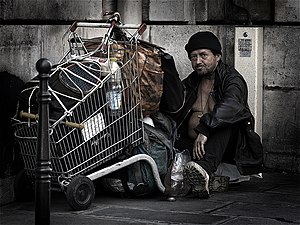
Back الفقر في فرنسا Arabic Pauvreté en France French Ịda ogbenye na France IG Бідність у Франції Ukrainian

Poverty in France has fallen by 60% over thirty years. Although it affected 15% of the population in 1970, in 2001 only 6.1% (or 3.7 million people) were below the poverty line (which, according to INSEE's criteria, is half of the median income).
An OECD study from the early 1970s estimated that 16% of the French population lived in poverty, compared with 13% in the United States, 11% in Canada, 7.5% in the United Kingdom, and 3% in Germany. Other national estimates at the time were 13% (the United States), 11% (Canada), 8% (Australia), 5% (Norway), and 3.5% (Sweden).[1]
In 1975, a basic tax-free cash allowance starting at £665 for children under the age of ten provided a considerable amount of support for families living on low incomes, and its combination with direct taxation meant greater support to poor families than in any other country in the EEC. A two-parent family with four dependent children on 66% of average earnings gained an amount after tax and allowances equal to 49.4% of its income compared with 8.2% in the United Kingdom. Nevertheless, that same year, INSEE found that at any wage level disposable income per head was still much lower in large families than those with no or very few children, while the cost of bringing up a family weighed particularly heavily on households headed by a low-paid worker. According to one estimate from the early 1970s, using 1500 francs net per month for those in full-time employment, 44% of women and 24.5% of men were low paid. The percentage of workers who were low paid was particularly high in personal services, such as hairdressing (74%), hotel and catering (60%) and textiles (51%).[1]
In comparison with the average French workers, foreign workers tended to be employed in the hardest and lowest-paid jobs. They also live in poor conditions. A 1972 study found that foreign workers earned 17% less than their French counterparts, although this national average concealed the extent of inequality. Foreign workers were more likely to be men in their prime working years in the industrial areas, which generally had higher rates of pay than elsewhere.[1]
In 1974, the National Assembly's Commission on Cultural, Family and Social Affairs estimated that 5% of the population should be considered as "living in a state of destitution or on the borderline of destitution". Studies by Serge Milano, Lionel Stoleru, and Rene Lenoir estimated that between 10% and 14% of the population lived in poverty from 1970 to 1980. A report by the EEC estimated that 14.8% of households in France lived in poverty in 1975, defined as living below the threshold of 50% mean annual income.
Previously, the poor were for the most part retirees. The trend reversed itself in the 1980s with an increase in unemployment among young people; while poverty among the elderly dropped 85% (from 27.3% to 3.8%), among those still in the workforce it increased by 38% over the same 30 years (from 3.9% to 5.4%). Various social welfare programs have had an important impact in low-income households, and in 2002, they may in some cases have represented more than 50% of the household's income.[2]
In 2008, the OECD claimed that France was "one of only five OECD countries where income inequality and poverty have declined over the past 20 years".[3]
As a result of the European migrant crisis, beginning in 2015, makeshift and squalid migrant camps have begun regularly appearing around the capital city with French officials routinely clearing and dismantling them as of October 2016. Such camps are also becoming a common occurrence in Northern France, along the coast of La Manche, which migrants hope to cross in an attempt to reach Britain. The Calais Jungle is perhaps the best known example of this.
- ^ a b c Victor George; Roger Lawson (1980). Poverty and inequality in Common Market countries. Routledge & Kegan Paul. ISBN 9780710005175.
- ^ (in French) Le rapport de l'Observatoire national de la pauvreté et de l'exclusion sociale 2003–2004 Archived 26 January 2007 at the Wayback Machine, second part Archived 24 October 2005 at the Wayback Machine and third part Archived 25 May 2011 at the Wayback Machine. See p. 26 of Part 1.
- ^ "Growing Unequal? : Income Distribution and Poverty in OECD Countries - COUNTRY NOTE: FRANCE" (PDF). OECD. 2008. Retrieved 23 May 2018.